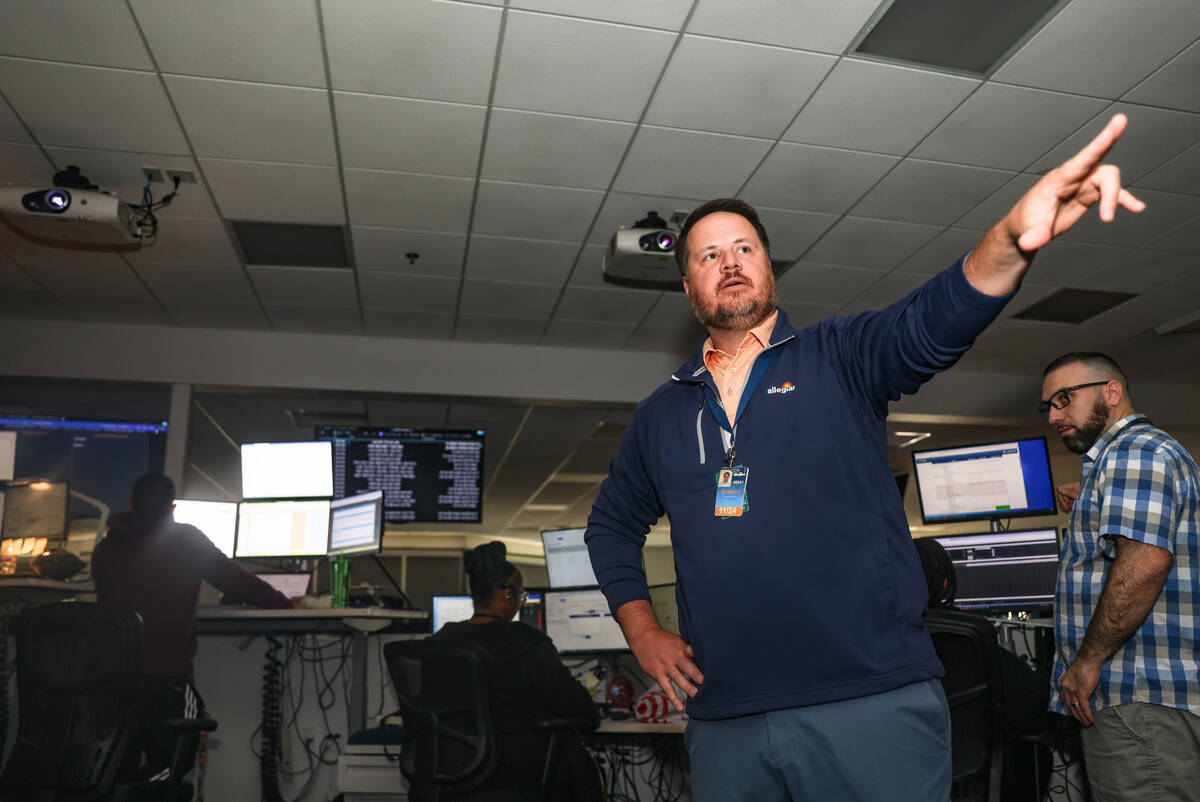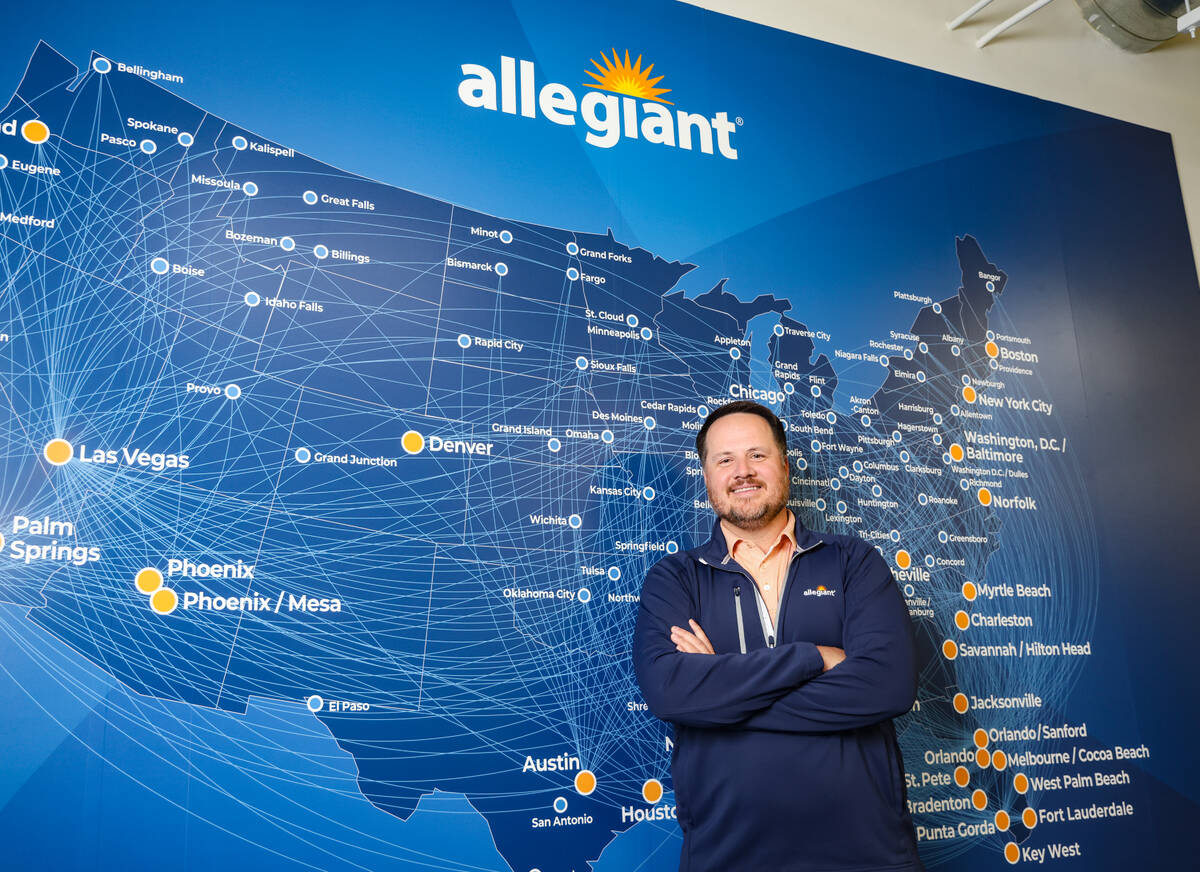New Allegiant CEO poised to take Las Vegas-based airline to next level
It only took about three years for aviation industry veteran Maurice Gallagher to transform Fresno, California-based Allegiant Air to Las Vegas’ hometown airline.
Gallagher took control of Allegiant out of bankruptcy in 2000 after the airline began flying western routes beginning in October 1998.
Once Gallagher took control, he built the business model that has made the company profitable and successful, flying from small towns across the United States to resort destinations in Las Vegas, Phoenix and multiple cities in Florida.
Most routes flown by Allegiant have no competition and the airline’s model includes flying during peak periods for tourists — days leading up to and ending weekends. Most of Allegiant’s fleet is grounded at midweek.
That type of scheduling works to the advantage of flight crews because every flight is out and back from a crew base. Pilots and flight attendants enjoy the advantage of being home at night after a day of flying.
Gallagher grew the business over time but he decided to step down from the CEO role in 2023 with longtime Allegiant board member John Redmond, a former MGM Resorts International and Caesars Entertainment executive who had been on Allegiant’s board since 2007, taking over as CEO in June 2023.
It wasn’t long before Redmond was out, resigning in September 2023, giving no reason for his departure. Gallagher returned to the CEO role, but in July 2024 announced his retirement and the appointment of Greg Anderson as the new CEO, effective Sept. 1.
Anderson joined Allegiant in 2010 and rose through management ranks on the company’s financial side. At the time of his appointment, Anderson already was president of the company and Gallagher said he’s confident in his ability to lead Allegiant, remarking that Anderson was already effectively operating as the CEO and the July announcement formally made it official.
Anderson discussed Allegiant’s future from the use of Boeing aircraft to the Harry Reid International Airport expansion in a recent interview with the Review-Journal. Comments have been edited for brevity and clarity.
RJ: How long have you been in Las Vegas?
Anderson: I’m actually a native to Las Vegas. I went to elementary school here, Walter B. Long Middle School at Fremont and graduated in 2000 from Las Vegas High School. My mom graduated from high school here. She was born and raised. She went to Western. Her dad was raised here and he went to the old Vegas High School. So I’m the fourth generation.
RJ: Was a career in aviation ever on your radar?
Anderson: I was going to be a history teacher. So not in my wildest dreams growing up would I have ever thought I was going to be in the aviation industry, but I’m glad I am. Once you have a chance to really be exposed to it and a part of it, it just kind of gets into your blood and your DNA and you really enjoy it and I do. too. I’m really thankful.
RJ: So you have this financial background and you obviously looked at the numbers for the company beforehand, but there’s a lot more that you have to do as a CEO. How did you embrace that learning curve and how did you go about getting to where you are in terms of being comfortable overall with the CEO position?
Anderson: I was just trying to do the best I could throughout the journey and was able and fortunate enough to have a lot of broad exposure throughout that journey through the various facets of the business, not just the finance side over the past 15 years.
RJ: Were there any areas you found particularly challenging?
Anderson: By coming through the finance or the accounting side of the house, I’m naturally more comfortable with that. But like IT, for example, as I’ve taken on some of the roles within our IT department, I’m just trying to get up to speed, not only meeting with the team more and listening and understanding, but reading books about IT and different types of structures to better educate myself. It’s a lot of hard work, and it’s a never-ending process.
RJ: Much of the Allegiant business model is nonstop flying. Are there other routes you’re looking at?
Anderson: Of the 558 routes we serve today, 75 percent are the only nonstop option. Our team has identified 1,400 incremental routes on top of the 558 that we serve today that fit the Allegiant model beautifully.
RJ: Allegiant tailors its schedule to meet the needs of your leisure customers. How do you do that?
Anderson: There’s three major periods throughout a calendar year that the U.S. leisure customer likes to travel, the very peak periods, March, the summer, and the holidays. And then there’s days of week, Thursday, Friday, Sunday, Monday. Those are like the peak days. And if you notice Allegiant, we really flex up our flying in those peak periods. And then in the off-peak, we pull it down. So even if there was competition or we’re flying against a Southwest or United or one of the other carriers on those routes, the fact we’re doing it on those peak days, they really don’t bother to address that or compete with us on our pricing. So it’s just such a unique model that we’ve been able to build over the years and we just continue to strengthen on those competitive advantages we see today.
RJ: Allegiant started out flying used aircraft that still had life in them, but that has evolved to a new fleet that next will include Boeing MAX jets. Walk me through how that evolved.
Anderson: As we’ve gotten to the size we’re at today, and we were looking over 100-plus aircraft, this was shortly coming out of the pandemic, we realized that as we want to keep growing this model, and get to 200-plus aircraft or beyond, it’s helpful to have new aircraft come in as a foundation to support that growth. Ultimately we decided to move forward with Boeing. This is back in late 2021, early 2022. We’ve operated three aircraft effectively at one period of time, when we had the MDs (used MD-80s or Mad Dogs), the 757s, and the Airbus. We’re confident that we can bring in another fleet type like the MAX aircraft from Boeing, because we’ll isolate bases by aircraft type, or isolate the fleet in various bases. So one base may be in all-A320 base and one base may be an all-737 MAX base. And so that helps mitigate some of the complexity of operating a multi or a split fleet. And again, everything’s out and back, out and back. So your crews, pilots, they have to be type-rated on a specific fleet type. You can’t be type rated on an Airbus and a Boeing MAX at the same time. It’s one or the other. So you kind of build those bases to be all Airbus or build a base to be all MAX and that really helps mitigate some of the inefficiencies for us. We’re the first U.S. carrier to operate the MAX 8-200. We just took delivery of our first 8-200 from Boeing. We flew it down to Mesa Gateway Airport where our crews will participate in drills with the FAA (for certification).
RJ: How do you feel about the recently announced expansion at Harry Reid International Airport?
Anderson: We operate roughly 60 routes, or serve 60 different cities at Harry Reid Airport today. Of those, 40 or so were the only nonstop option. So we’re bringing a unique customer into Las Vegas. And being the hometown airline, that’s something we’re really proud of and we want to continue to strengthen our footprint here in Vegas. As we were looking ahead, we were looking at some potential constraints with gate access. And so we’re encouraged by some of the expansion and we work closely with (Clark County Aviation Department Director) Rosemary Vassiliadis and her team out at the airport just to make sure that Allegiant has the space we need and so we can continue to bring in those unique customers here into Vegas. I can’t say anything yet about what we’re looking at today but we just want to make sure that we’re looking out ahead and we’re having constructive dialogue with the airport leadership team over there to ensure that Allegiant continues to have the proper real estate footprint to grow and support Vegas in the way Allegiant can.
Contact Richard N. Velotta at rvelotta@reviewjournal.com or 702-477-3893. Follow @RickVelotta on X.



















